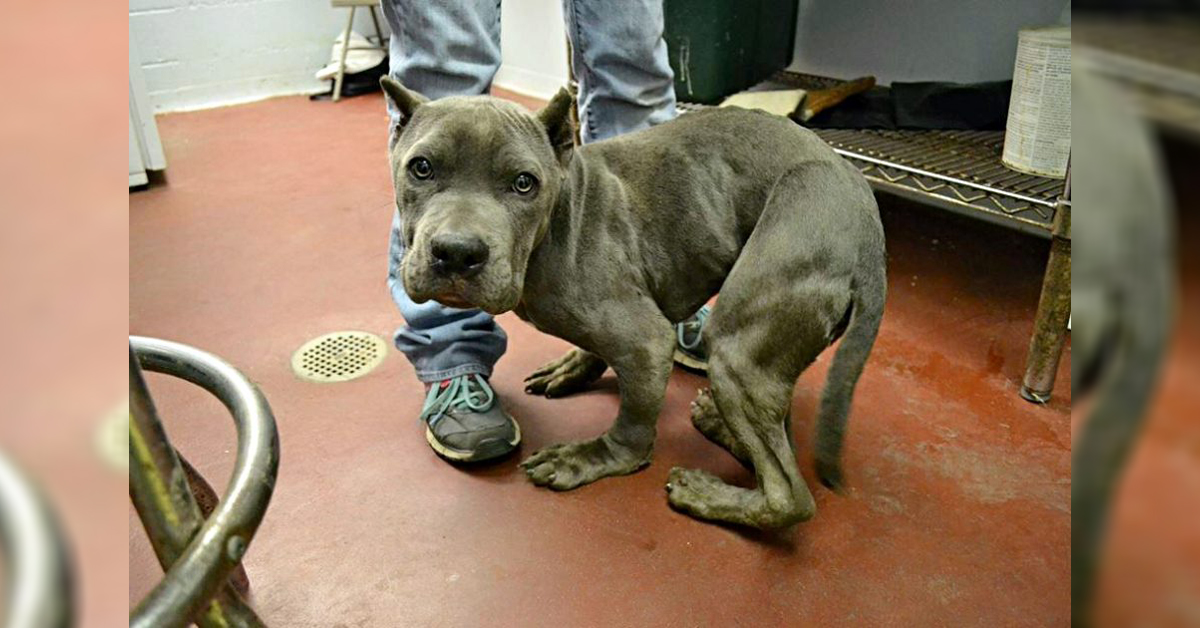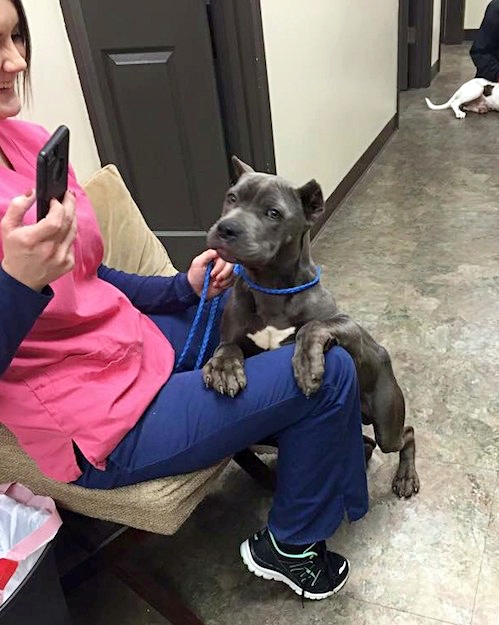This story speaks about a poor Pit Bull called Landis, who spent 2 years of his life inside a cage as his previous owners did not allowed him to be out of it, writes thepetneeds
As Landis grew up during these two years, the cage became too small for him, so this made his body deformed and dwarfed as he wasn’t able to grow in a proper way.

Fortunately, Landis was taken by a shelter in Georgia to an animal hospital to be evaluated, hoping that they could treat his flat feet and hunched body. Thankfully, the shelter gave Landis the great care he needed. And he was at a really paradise despite being at a shelter. Second Chance Rescue was then called by the shelter for further help and they directly agreed to take him in, in New York City.

He was given hydrotherapy, physically therapy, and medical treatment to help straighten out his body. Landis, who has gone through a very bad life, was still so adorable and liked to give attention from everyone he met. Thankfully, he was adopted by a kind family near Cape Cod in Massachusetts, and he can now enjoy his time on the beach to straighten his legs with the sand.

Share this with your family and friends.
Source: thepetneeds.com
---------
10 Common Dog Health Problems
Some health problems are specific to certain breeds, such as breathing complications for flat-faced dogs. But several other canine health issues can affect any dog. Here are 10 typical health conditions you need to watch out for in your four-legged best friend:
Top 10 Common Dog Health Problems
Skin Problems
One of the most obvious signs that your dog has a skin condition is itching. Other symptoms that may suggest that your dog has a skin problem include rashes, redness, dry skin, lumps, bumps, skin sores, dandruff, and hair loss.
Ear Diseases
Approximately 20 percent of dogs suffer from ear disease. It’s particularly common in breeds with floppy ears like cocker spaniels and basset hounds. It’s common to see wax buildup or discharge in their ear canal. But others may experience pain, itchiness, redness, swelling, and crusting in the ears.
Urinary Tract Infections
Simply known as UTI, this condition can make it uncomfortable for your beloved companion to pass urine. Signs of urinary tract infection include drinking water more than usual and passing urine more often than usual. Your dog may also only pass a small amount or lose bladder control. Additionally, you may see blood in their urine or notice a strong smell to it.
Vomiting
There are countless reasons why your pet may throw up. You don’t need to visit the vet each time your dog vomits. But it’s also not something you can just ignore. Don’t try to guess. If the vomiting persists or occurs with other symptoms like diarrhea or lethargy, you need to rush to the vet. It could be a sign of severe health problems, such as poisoning or gastrointestinal blockage.
Diarrhea
This symptom may occur on its own or be accompanied by vomiting. Its potential causes are similar to vomiting. One or two episodes of diarrhea may not be a pet emergency. But recurring diarrhea can result in dehydration.
Parasites
At some point in their lives, your pet may have to deal with discomfort due to internal or external parasites. Symptoms of parasites generally vary, depending on a few factors. These include the kind of parasite that has plagued your pet, where it lives, and how severe its infestation is.
Dental Issues
Like us, your dog can develop canine dental diseases due to high levels of plaque buildup. Several signs indicate that your pet may have dental disease. These include difficulty eating, bleeding of the gums or teeth, loose teeth, and bad breath.
Obesity
Nearly 30 percent of the general dog population is considered obese. Several factors contribute to a pet’s risk. These include age, genetic predisposition, lack of exercise, and overfeeding, among others.
Arthritis
This joint problem can restrict your dog’s mobility. Bring Fido to the vet if you see your dog slow down or limp before and after walks. Other signs include licking or chewing on tender areas and behavioral changes.
Poisoning
Symptoms of dog poisoning vary widely, depending on the kind of toxin a pet has been exposed to. The signs can range from vomiting to drooling, breathing difficulties, seizures, or worse, coma. Some of the most common poisonous substances are human foods like chocolates, grapes, raisins, onions, and caffeine. Other known culprits are human medications, household cleaning products, pesticides, and some plants.




GIPHY App Key not set. Please check settings